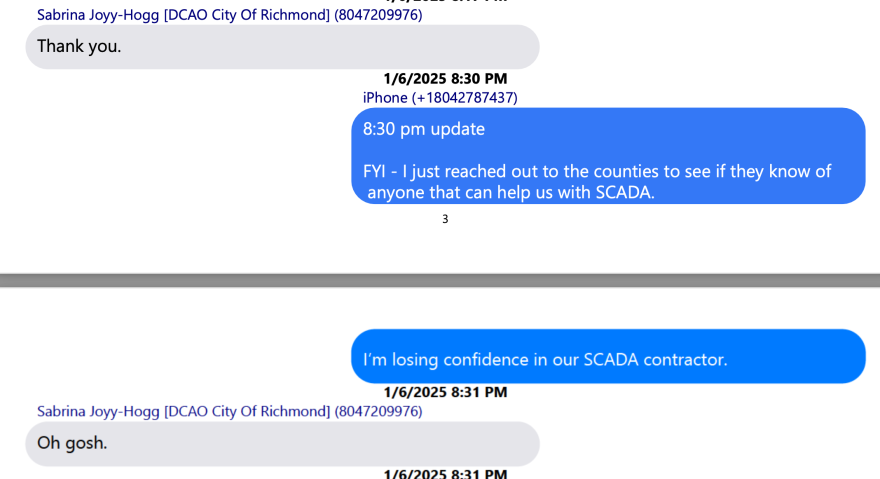The City of Richmond released initial findings from the investigation into its early January water crisis around 4:45 p.m. Thursday.
The Kansas City-based engineering firm HNTB examined the water system between Jan. 27 and 29, and expects full findings to be released by March. It’ll cost the city $234,000.
The report offered seven preliminary and three longer-term recommendations, but concluded, based on a tour of the facility and interviews with 14 staff members, that there were no set safety protocols or written training manuals at the water plant during the outage.
While the report found DPU does have an emergency manual, it “lacks facility and process-specific actions.”
The finding comes after two city audits determined there were no written policies at DPU’s warehouses.
Among the report’s recommendations is updating the Supervisory Control and Data Acquisition system — which automatically monitors processes and collects data on operations at the plant — and setting the switchgear to “summer mode,” limiting “the risk of a complete WTP power outage … .”
A long-term recommendation for the city was to raise “as many critical electrical systems above the plant basements as practical.”
“Since water service was restored, the City has made a series of changes to plant operations and equipment. That includes millions of dollars in investments towards the recovery work, much of which has been spent on equipment upgrades and repairs,” Mayor Danny Avula said in the press release that accompanied the report. “We have also made meaningful changes to plant procedures, consistent with several HNTB recommendations, as part of continuing efforts to make water treatment plant operations more resilient.”
The city’s set a 9 a.m. Friday press conference to discuss the findings.
Henrico and Hanover counties, which both buy water from the city, commissioned third-party reviews of their own responses to the water outage. Each found Richmond communication failures hindered their respective abilities to act appropriately.
After their reports were released earlier this week, both county’s supervisors said they’d support creating a group to oversee the regional water system or consider other options to be less reliant on the city.
There were no set safety protocols or written training manuals at Richmond's main water treatment plant during the outage.
VPM News obtained several documents through city requests and the Freedom of Information Act that further described operations at the Richmond Department of Public Utilities and its water treatment facilities.
A 2022 Environmental Protection Agency audit of the system determined an asset management plan was not used to track Richmond’s drinking water infrastructure. Instead, DPU uses a 2020 technical memo to help manage its assets.
According to a copy of that memo, the city hired engineering consultants Whitman, Requardt & Associates LLP for the assessment after finding assets were not logged and multiple issues locating items for work orders.
DPU incorporated recommendations from the document — called a condition assessment — into its capital improvement plan. Those are “phased over multiple years based on the priority,” DPU spokesperson Rhonda Johnson wrote in an email to VPM News.
The 2020 assessment identified 42 high and critical risk assets that “should be monitored diligently by the City.” The memo stated two critical risks, which were redacted by DPU as “security vulnerabilities,” should have been addressed immediately.
Johnson and other city representatives did not respond to questions about whether these assets were repaired or replaced.
The assessment also determined the water plant’s electrical equipment was not in ideal condition. According to the memo, the city had $1.5 million in deferred maintenance for its electrical assets, while the total replacement costs were $6.2 million.
Richmond officials faulted the water plant’s switchgear failure on Jan. 6 for preventing use of its secondary source during the snowstorm-related power outage. The 2020 assessment identified the switchgear building as one of 13 facilities in “poor” condition.
“The component that failed during last month’s power outage has been replaced,” Johnson told VPM News when asked about the part. In early January, she was not able to say how much the replacement would cost.
The water plant’s IT system, SCADA, also failed in January; city officials had issues trying to get it back online during the power outage.
April Bingham, DPU’s former director, told Richmond’s interim Chief Administrative Officer Sabrina Joy-Hogg on Jan. 6 that she was “losing confidence” in the city’s SCADA contractor, according to texts first reported by The Richmonder.

The SCADA system, installed in the 1980s, is “obsolete” as it uses outdated technology and equipment, according to the city’s website. A contract was awarded in 2015 to replace the system, and nearly $5.5 million had been spent on the project as of Dec. 19, 2023.
Another request for SCADA replacement bids was posted Nov. 22, 2024, with a due date to submit proposals set for Jan. 6 — the day the water plant failed. DPU’s internal CIP shows the SCADA replacement has a $5.4 million budget.
A 2018 report prepared by TYLin on the two-tank, 55-million-gallon reservoir roof paints a picture of continued deterioration — sometimes gradual, other times rapid — and of a structure that was near the end of its “effective remaining life” decades ago.
In a past life, the Byrd Park reservoir was an open-air, raw water storage tank. But it later became the city’s largest store of treated potable water — a status it retains today. A sealed roof was added in 1971.
When properly constructed and maintained, no outside contamination should enter the structure. But deterioration in several parts of the reservoir forced repairs to keep it watertight.
The TYLin report identified 34 areas in “severe” condition, citing issues like drooping roof sections, leaks in the reservoir’s waterproofing membrane and corrosion in reinforced concrete structures.
The report noted the threshold for a “severe” designation is lower with the Byrd Park facility than others, because a failure of the reservoir’s roof would have immediate impacts on residents’ ability to access clean water.
“It is expected that the existing 46 year old roof structure is very close to the end of its effective remaining life,” according to the inspection, which was conducted in November 2017 — though the report notes certain “severe” areas could be repaired to reduce the short-term risk of failure.
The 2018 report made several recommendations. But more than 30 pages of the roughly 100-page report — detailing the deterioration of specific “severe” areas over 15 years — were redacted by the city. Several recommendations, including full roof replacement “within the next few years,” were still visible.
Work to demolish and replace the roof structure began in 2023.
The final unredacted line in those recommendations: “The intended life expectancy of the Reservoir’s roof structure is currently expired.”





